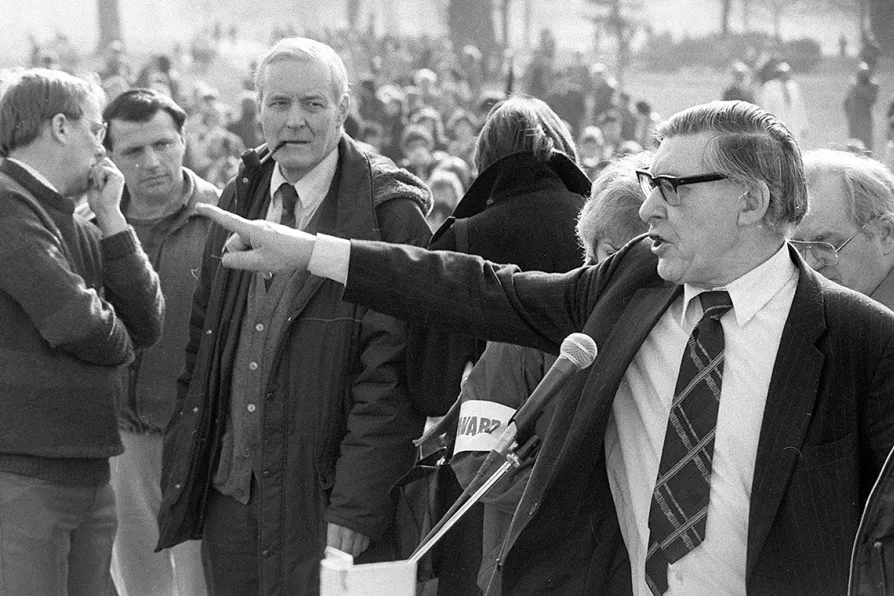
 Mick McGahey, vice-president of the National Union of Mineworkers addresses a rally, attended by MP Tony Benn, February 14, 1985
Mick McGahey, vice-president of the National Union of Mineworkers addresses a rally, attended by MP Tony Benn, February 14, 1985
IN SATURDAY’S paper Roz Foyer quoted Mick McGahey’s famous comment: “The trade union movement is a movement not a monument.”
It is so because it is made up of people who collectively know far more about their country than all the governments, think tanks and political parties combined. And as trade unionists they workers have the collective power to do something about it.
The motions before this week’s Scottish TUC Congress seek such action — and portray a Scotland that desperately needs change.
It is a country where workplace stress is running out of control. Among healthcare professionals there is a 6.2 per cent absence rate. Midwives are leaving their profession in their early forties. Across Scotland 17 per cent of households face food poverty. For young workers apprenticeships have fallen by 28 per cent over the last decade. Further education has been slashed and this year for the first time councils have been cutting teacher numbers.
And housing? It was Scotland that led historically led the fight for council housing. Yet today Scotland has virtually no new public-sector housing available. Private rents are a quarter higher than those in England. Rents for new lets rose by over 15 per cent in 2022-23 alone. Homelessness is at record levels.
There has indeed been a fightback over the past year. Some 450 strikes have done something to defend living standards and services. So has pressure on the Scottish government, mainly from the STUC, to move a little way towards a more progressive taxation system. Yet the financial situation remains desperate. Central government enforced cuts, the driving force behind the assault on the public sector, are scheduled to continue to 2028 and beyond.
Still more problematic is the political situation. Scotland’s SNP-Green coalition has long supported partnership with the private sector on social care, transport, housing provision and other sectors. Keir Starmer has now made it clear that, while there may be some repeal of anti-trade union legislation, Labour will continue with private-sector partnership except in exceptional circumstances. His latest pledge to increase arms spending, “when feasible,” to 2.5 per cent of GDP will mean another massive £11 billion taken out of public services.
This is why the trade unions have to become much more of the kind of movement they were in McGahey’s day. Then they had the political cohesion to inflict a series of defeats on Labour as well as Tory governments whenever they backed capital against labour.
We can see the beginnings of such unity in the major composite motions before the STUC congress: on progressive taxation, climate change and just transition, employment law and social care free at the point of need. Yet there still remain contradictions and absences.
Trade unions have opposed cuts but only rarely have they joined with local communities to demand that, as in former periods, councils defy governments.
The movement’s traditional internationalism has been demonstrated in solidarity with Gaza. However, there has been hesitancy in important unions about opposing weapon sales to Israel. Worse, there has been a major division around Britain’s escalating military expenditure and a corresponding failure to speak out for a just peace in Ukraine and to oppose the manifest war drive by the US. Freedom of information requests show that political lobbying by arms companies is as rife in Holyrood as it is in Westminster.
McGahey was a realist. He did not believe in phantoms. But he also knew that a movement could not be mobilised without an understanding of the nature of the capitalist beast it faced. Nor, without posing an alternative, could it inspire unity across our communities to form the genuinely broad class-based movement needed today.














